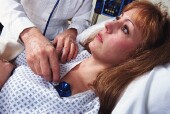
MONDAY, March 26 (HealthDay News) — Women should be screened for heart disease — a leading cause of death among women in the United States — during routine visits to obstetrics and gynecology clinics, a new study suggests.
Researchers from Mount Sinai Medical Center in New York City found that heart screenings performed during visits to obstetrician/gynecologists could help identify women with undetected risk factors for the condition. In addition, the screenings could significantly increase awareness among women about heart disease prevention and treatment, the researchers added.
“There is a real disparity in the medical community where we tend to think heart disease is a disease of men, and historically we have not done a very good job of screening women for cardiovascular risk factors,” the study’s principal investigator, Dr. Roxana Mehran, director of interventional cardiovascular research and clinical trials at Mount Sinai Medical Center, said in a news release from the American College of Cardiology.
“It often doesn’t occur to women that they could have a heart problem until their symptoms are very advanced, so we have to think differently and be creative about how we identify, educate and treat women at risk,” Mehran explained.
In conducting the study, the researchers asked 10 ob/gyn clinics to put a screening program in place to identify women with symptoms or risk factors for heart disease. Over the course of two years, more than 2,200 women completed a one-page survey on traditional and gestational heart disease. Women who were never screened for heart disease before also had their blood pressure taken.
The program revealed that 69 percent of the middle-aged women screened had heart disease risk factors. Meanwhile, 42 percent also had symptoms of the condition. The investigators also found that 18 percent of the women screened considered their ob/gyn to be their primary health care provider.
Among the women in the study, a significant number either had never been checked or were unsure if they had been checked for high blood pressure (21 percent), high cholesterol (38 percent) or high blood sugar (19 percent). Following the screenings, 25 percent of the women were referred to a primary care physician or another specialist for further treatment for heart disease.
“We found a real lack of awareness among many of these women that they had risk factors, including diabetes, high blood pressure and high cholesterol. Ob/gyn practices have an incredible opportunity to make an impact on heart disease in women by screening, educating and directing women to the right providers, so we hope to see continued research in this area,” Mehran said.
The study authors noted that more research involving a larger group of women is needed to determine if screenings at ob/gyn clinics improve outcomes among women with heart disease.
The study findings were scheduled for presentation Sunday at the annual meeting of the American College of Cardiology in Chicago. The data and conclusions of research presented at medical meetings should be viewed as preliminary until published in a peer-reviewed journal.
More information
The U.S. National Library of Medicine has more about heart disease in women.

